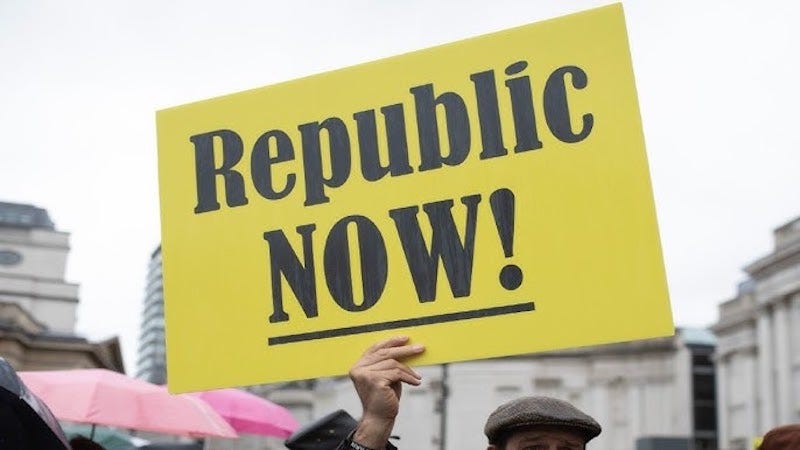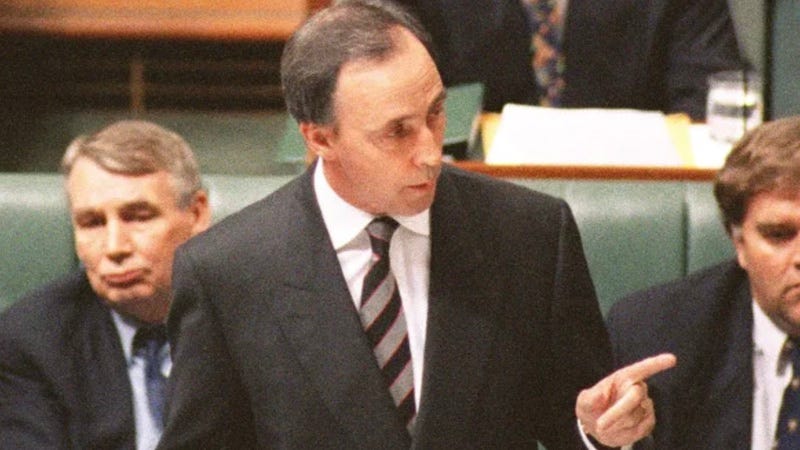When will Australia embrace a republic of ideas?
A republic should stand as a model of inclusive governance, rewarding ability and commitment to public service over the inherited status of a British king.
The royal visit to Australia by King Charles III and Queen Camilla is over – a cursory glimpse at the colonised subjects of the British Crown – but it has prompted a subdued, yet vital revival of the Republican movement in Australia, highlighting a paradox that’s deeply ingrained in the country’s political and cultural fabric.
Australia often prides itself on being the land of the “larrikin” – a place of easy-going individualists who challenge authority, a place where fairness and mateship supercede obedience to outdated institutions. However, in reality, Australia has proven to be anything but a nation of self-determined rebels when it comes to its relationship with the British monarch. Instead, the country often stands deferentially in line, reluctant to offend a foreign king or criticise the centuries-old institution he represents. This institution, steeped in colonialism, imperialism, and the legacies of genocide, remains politely accepted by a country that claims to reject such past atrocities.
This compliance extends well beyond attitudes toward the monarchy; it permeates the very governance and structures that uphold Australia’s legal and social framework. The state increasingly resembles an enforcer of conformity, a warden, rather than a protector of public liberty. Australians watch, largely subdued, as voices are silenced and protests are swiftly subdued. Unions, once a backbone of resistance and workers’ rights, have been made fragile by decades of institutional suppression. Protesters face arrest not for violent actions but for just daring to express dissent. The larrikin ideal, in many ways, is a distant myth that seems to crumble further each time Australia willingly bends to the grips of authority rather than standing tall against it.
Such a stance sharply contrasts with the vision of former Prime Minister Paul Keating, who, in 1992, had the boldness to challenge the monarchy and call for an Australian republic. At the time, Keating argued that nations could either passively respond to public sentiment or act as leaders, guiding people toward the future they deserve and he envisioned an Australian head of state who would embody the nation’s contemporary values, a representative of its diversity, aspirations, and the evolving partnerships Australia fosters in the Asia–Pacific region. Keating’s Republican initiative wasn’t about nationalism or exclusion but rather about acknowledging the growth of Australian society, a mature, inclusive view that recognised the importance of constitutional reform as a means of solidifying Australia’s independence and true sovereignty, and creating a clearer pathway for reconciliation with Indigenous people.
However, the challenge lies far beyond the symbolic head of state. Changing the figurehead is a comparatively easy task when considered alongside the monumental reforms required to make the Constitution, as well as the institution it represents, reflect modern Australian society. The connection between these institutions and the Australian public has been fractured for years. Constitutional reform should not stop at severing ties with the monarchy; it should go further, seeking to overhaul governance structures and reimagine democratic processes to prevent the abuses of power and lack of accountability seen in recent history.
Australia’s previous attempt to move toward a republic, the 1999 referendum, floundered in part due to the narrow, minimalist and elitist framing of the debate. Political leaders and wealthy stakeholders dominated the discussion, creating an atmosphere that alienated the everyday Australians who would stand to benefit most from republican reform and this disconnect left the movement without the grassroots support needed to succeed. The referendum was also marred by internal discord among supporters and a lack of a cohesive vision for what an Australian republic could truly look like. It was not a movement fueled by the people’s interests but rather by the ambitions of a select few – a flaw that contributed to its downfall.
In this context, another referendum, especially after the recent failure of the Voice to Parliament, may feel like a distant prospect. Current Prime Minister Anthony Albanese, despite early support for a republic, is hesitant to tackle another divisive issue in the wake of that defeat, even going to the extent of removing the position of Assistant Minister for the Republic in July 2024. This delay is not only a political tactic but an indictment of a system that continually places critical decisions at the mercy of electoral cycles, where true reform risks taking a backseat to political expediency. The Republican movement, if it is to succeed, must find its footing beyond party lines and influential backers, connecting instead with the people it seeks to empower.
An urgent need for democratic renewal
Australia’s deeply ingrained she’ll-be-right-mate attitude has created a culture of political inertia, stifling progress and hindering meaningful reform. This complacency, a comfort with the status quo, has allowed the nation to drift rather than actively shape its future, especially when it comes to constitutional reform and modernising democracy. Instead of fostering an engaged, adaptive political environment, Australia has become a ‘lazy’ democracy – one that not only resists change but also makes it actively difficult for citizens to engage. While the mechanisms of democracy are technically available, they are increasingly dominated by organised interest groups and corporations, overshadowing the voices of the general populace. This passive approach has ceded significant space to powerful, right-wing forces, whose influence grows as the political will to counterbalance them falters.
In this stagnant political climate, corporations have thrived, their influence strengthened by a government that operates more secretively and serves the interests of a select few. When citizens are not given an easy avenue to participate in or influence their democracy, they are effectively locked out of the decisions that shape their lives, leaving corporate interests to fill the vacuum. This secrecy and resistance to change have created a system that seems deliberately designed to favour those with power and wealth, while the majority remains politically disconnected and disempowered.
Attempts to disrupt this status quo are often met with fierce resistance. For example, when Keating declared in the 1990s that Australia should look to Asia for its future rather than Europe, his assertion ignited a nationwide backlash. The visceral reaction to this idea exposed an unwillingness to embrace Australia’s geographic and cultural reality, showing a nation still clinging to outdated ties and hesitant to define a truly independent identity.
This reluctance to change – to even acknowledge the need for change – has kept Australia tethered to antiquated values and a hierarchical social order that perpetuates privilege. It’s a mindset that discourages daring leadership, one where new ideas or bold directions are often seen as threats rather than opportunities. When leaders hint at change, the political rhetoric shifts toward fear: any shift from the status quo will allegedly compromise what citizens already have, creating a politics of envy that pits Australians against one another. Instead of fostering solidarity or collective vision, the narrative centres on loss, risk, and resentment, a formula that has reliably suppressed democratic enthusiasm and keeps people clinging to familiar patterns.
Australia’s past as a penal colony may explain some of this conservatism, with an inherited tendency to comply rather than question. But perhaps it’s more reflective of Donald Horne’s famous observation in The Lucky Country: that Australia is a place blessed with abundant resources but often led by unimaginative, second-rate leaders who are more interested in preserving their own influence than in pursuing ambitious reforms. Over time, they have streamlined institutions that are self-serving, designed to maintain the comfortable positions of those in power while failing to serve the broader public effectively. This “second-rate” mentality has left Australia in a state of democratic atrophy, where public institutions are becoming increasingly hollowed out, offering little to those they were originally created to serve.
It’s unlikely that Prime Minister Albanese will be the one to break this cycle, certainly not in the foreseeable future. But it will require more than symbolic gestures; it will demand a direct challenge to the complacency that has kept Australia from realising its potential as a fully independent nation. This challenge involves more than severing ties with the monarchy or altering constitutional language – it requires a fundamental transformation in how Australians engage with their democracy and a willingness to accept that real progress often comes with discomfort and uncertainty. Without this shift, Australia risks remaining a comfortable, yet stagnant, democracy – one where the only true beneficiaries are those already in power.
Seizing the moment and moving toward an inclusive republic
Of course, Australia will always have the opportunity to reshape its democracy, fostering a more equitable relationship between the government and the electorate, and creating a genuinely representative system. However, it depends on the presence of political will, which at this stage, is nowhere in sight. Over the past four decades, the link between government and the electorate has been diluted by neoliberal policies, privatisation, and a shift in focus from serving the public to catering to corporations and vested interests. As essential services and utilities have gradually been sold off to private interests, the government’s role has narrowed, becoming more about managing the demands of corporate stakeholders than fulfilling its duty to the people.
This shift means that while elected governments may change, the corporations controlling these vital services remain constant, wielding significant influence without the accountability mechanisms of a democratic process. The compact between government and the electorate, once stronger and more direct, has morphed into a partnership between government and private corporations, with citizens relegated to the role of passive observers rather than active participants in democracy.
To establish a true republic, Australia must re-evaluate and dismantle this arrangement, restoring government responsibility and accountability to the people it is meant to serve. The reforms required go beyond superficial constitutional adjustments; they demand a restructuring of how government operates, who it answers to, and how the interests of the electorate are prioritised over those of powerful corporations.
Achieving these changes is no easy task, especially in a country where reforms occur at a glacial pace, hindered by an elite political and corporate class that fiercely guards its privileges. A true republic for Australia cannot coexist with an elite that considers itself above accountability and resists being challenged on merit and Australia’s institutions must represent the diversity of its population, not the narrow interests of a few who inherited power rather than earned it.
Privilege should not be an unchallenged entitlement passed through generations; rather, opportunity should be accessible to all, regardless of one’s family background or educational pedigree – and any change should start at the very top: the removal of an inherited King who resides in a foreign country. The republic should stand as a model of inclusive governance, rewarding ability and commitment to public service over this inherited status.
At its core, this transformation requires a shift in values – from an Australia that clings to the lazy lucky country narrative, to one that envisions itself as a land of true equal opportunity and democratic integrity. Only then can Australia create a republic that genuinely represents its people, where government policies prioritise public wellbeing over corporate profits, and where the relationship between government and citizens is restored to one of trust and accountability.











During the coronation, republican Britons wore "Not My King" tshirts and protested. After the "royal" visit to Australia, the media navel-gazes over whether Senator Thorpe has renounced her pledge of allegiance by shouting "Not my king" at Charles. I fear at this rate this, England is going to become a republic first. That'll be a tad embarassing.
Australia unfortunately is a nation of followers not leaders. We have a tendency to sit back and watch the rest of the world make their decisions and we capitalise on others mistakes for our own advantage but really it is to our detriment in the long term.